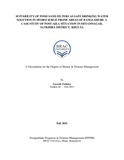| dc.contributor.advisor | Nishat, Ainun | |
| dc.contributor.author | Farhana, Sayeeda | |
| dc.date.accessioned | 2012-05-24T06:25:58Z | |
| dc.date.available | 2012-05-24T06:25:58Z | |
| dc.date.copyright | 2011 | |
| dc.date.issued | 2011 | |
| dc.identifier.other | ID 10268013 | |
| dc.identifier.uri | http://hdl.handle.net/10361/1822 | |
| dc.description | This dissertation is submitted in partial fulfillment of the requirements for the degree of Master in Disaster Management, 2011. | |
| dc.description | Cataloged from PDF version of Dissertation. | |
| dc.description | Includes bibliographical references (page 50). | |
| dc.description.abstract | This study focuses on the suitability of Pond Sand Filter (PSF) as safe drinking water option in storm surge prone areas in the south-western coastal areas of Bangladesh both at normal times as well as during disasters. This study area is subjected to floods, tidal surge and river erosion but most commonly to cyclones and storm surges. Now with added effect of climate change, such calamities occur more frequently. River water in the area is saline and thus availability of potable water for drinking purpose is already a big challenge. Recently Pond Sand Filter (PSF) was introduced as a suitable option for water supply that treats rain water reserved in a pond. PSF is a simple technology in which water is pumped from a pond and passed through a number of chambers containing sand and gravel. The treated water is usually safe for drinking.
Cyclone Aila, a category 1 cyclone, hit the Satkhira and Khulna districts of Bangladesh in 2009 and resulted in devastations which are still evident. The cyclone induced storm surge brought much saline water inland as many ponds and tube-wells became unusable. Of the seven upazilas in Satkhira district, Shymnagar upazila was most severely affected (where 243,293 were affected out of a total affected mass of 569810). Munshiganj union of Shayamnagar upazila was selected as the study area where more than 25,000 people were affected by the disaster. In this study area, intervention of PSFs had started in 1984 as one of the drinking water options and pond sand filters seemed a well accepted technology. However, its suitability in the current disaster and salinity context has not been assessed and therefore, functioning of randomly selected PSFs were studied. The thesis discusses the causes and effects of water crisis in such storm surge prone areas and various water interventions over time.
As research methods, both secondary and primary sources were applied. The tools utilized were informal interview, Key informant interview and physical observation. The groups targeted to be interviewed were community people/ users of the PSF, care-takers maintaining PSF, local elites (such as members or chairman of the village) and officials of non-governmental and governmental organizations. The PSFs were assessed based on the drinking water quality, management of the technology and its resilience towards disaster.
In the study, it was found that during normal time, the functioning of PSFs and the quality of drinking water depended upon availability of fresh water in the ponds and its maintenance. According to the locals and experts, PSF’s resilience towards disaster could be enhanced through raising pond banks to prevent intrusion of saline water during disasters. In these regards, communities’ collective effort and contribution was predominant which seemed to be missing. The operation of PSFs after disasters depended upon quick repairing and recovery of PSFs and its adjacent ponds. As a result of time constraints, no conclusion on the suitability of PSFs can be drawn. However, for further study, larger sample size of PSFs and target locations under various geographical contexts can be taken. Modified versions of PSFs could also be assessed in comparison to the regular ones to understand its suitability in the region. | en_US |
| dc.description.statementofresponsibility | Sayeeda Farhana | |
| dc.format.extent | 76 pages | |
| dc.language | en | |
| dc.publisher | BRAC University | en_US |
| dc.rights | BRAC University dissertation are protected by copyright. They may be viewed from this source for any purpose, but reproduction or distribution in any format is prohibited without written permission. | |
| dc.subject | Disaster management | |
| dc.subject | Pond sand filter | |
| dc.subject | Safe drinking water | |
| dc.title | Suitability of pond sand dilters as safe drinking water solution in storm surge prone areas of Bangladesh: a case study of Post-Aila situation in Shyamnagar, Satkhira district, Khulna | en_US |
| dc.type | Dissertation | en_US |
| dc.contributor.department | Department of Architecture, BRAC University | |
| dc.description.degree | M. Disaster Management | |

